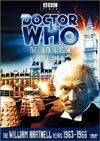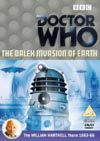DVD Extras include:
The BBC Television version: - directed by Richard MartinRichard Martin is back, sinking his teeth into his first full story as a director, and leaving it dying if not dead. It's basically a hit-and-miss luck-of-the-draw as to which elements manage to work and which ones don't, giving the final product the overall feeling that it was created by amateurs. The pseudo-live recording techniques used to make this program are certainly difficult to work under at the best of times, and even more so when action and pioneering special effects are attempted in a sci-fi blockbuster story such as this. While I believe the valiant efforts by experienced actors, cameramen, and other production personnel still gave us many good bits here, it seems to be the overarching guidance from the director, in terms of performances, timing, and camera blocking, that fails to stay on story and lets the show down.
In fact, most of the directing in this story lacks any sense of realism or dramatic quality. The Robomen are so brain-dead, clumsy, and martial art-less that there is absolutely no sense of menace about them. There is only one threat, in that they move and talk so slowly that the audience is in grave danger of falling asleep or changing the channel. The Daleks' voices are modulated, yet somehow rather quiet and subdued, and the voice performances are completely uninspired, sounding tired, bored, and high-pitched like little old grannies. Hardly the conquerors of an entire planet. The series regulars do a mostly good job, since they figured out what they were doing on the series long before, but Richard Martin still gets them to stare long, hard and woodenly at a dangling paper plate that jiggles its way across a photo of London. At least CGI can fix one side of this dysfunctional scene. The sound effect of the pathetically silly Slyther creature, while already super-hammy all on its own, is made to interrupt Ian's dialogue and compete with it, while a long, dead silence precedes and follows said struggle. In this way, otherwise solid performances are being unnecessarily weakened by poor directing. As for the `action' sequences, these are pretty bad. Confusion reigns, as the cameras are not able to follow the sequences properly to show viewers what the characters do, what happens to them, what motivates them to react a certain way, why they don't do the obvious, etc. The raid on the saucer at the heliport is the worst example of this. Instead of fighting the Daleks, Barbara and Susan fight each other. Why? Your guess is as good as mine. Neither the dialogue nor the acting is well-motivated here. A lot of effort must have been spent in designing an effects shot where the lower portion of the screen dissolves to a second input showing a melting effect, to show what happens to a section of wall when our friends hide behind it and the Daleks hit it with their rays. This effect is actually quite unnoticeable, because the characters moving in the background naturally draw attention to themselves, and neither a visible ray from the Daleks nor a significant change of lighting on the wall itself will draw the viewers' eyes to it, nor is there any dialogue about it or reaction to it. These are the things that the director wastes his efforts on: instead of figuring out how to tell the story with dramatic power, he strives in vain for the artsy camera angle and a host of mislaid visual effects. Francis Chagrin's music is nothing to write home about. Mostly, it's just too simple and non-inspiring, a collection of long-note organ chords rather aimlessly going nowhere in slow motion, later on with a light bit of percussion thrown in. This works to an extent for the first episode, lending a bit of a creepy atmosphere for the travellers' investigation of their ordinary but abandoned surroundings and indicating that something just isn't right. (My own experiments prove that Delia Derbyshire's stock tracks, used in "Inferno" [story no. 54], would work much better at achieving the same effect in these sequences). In later episodes though, the repetitive inappropriateness of Chagrin's organ chord music becomes too much to bear, doing nothing for the action scenes or the quiet expressions of human emotion and philosophy which the remainder of the story spends most of its time alternating between. The one scene where the music is truly of note is the filmed sequence of Daleks in the centre of London's most famous landmarks, which is one of the highlights that this version of the story offers.
Saved by the OutdoorsThis is one of the few areas where the television version seems to offer something worthwhile - in its outdoor filmed sequences. These work in most cases, and save the episodes from being a complete and utter waste of viewers' time. The exterior mining sequences also work well, with Daleks on hand to supervise their human slaves working the mining cart and track, plus a few stock shots of miners drilling away - all this has a great sound montage, but begs for a good musical track to be complete. Episode One's exterior scenes are also satisfactory, but not brilliant. The driving sequences in episode four gain a sense of realism from the film of the truck, but while we get spectacle and plot movement, we are still denied the sense of character and menace that would make such sequences work better.The television version is also unique in featuring a romance between Susan and David, and the two have many emotional scenes which are fairly well done for the most part - unlike the infamous exploits of Star Trek's Captain Kirk, or Blake's 7's Servalan, these scenes work for me because they actually lead somewhere in terms of series' development. Peter Fraser, playing David, often displays the exaggerated gestures and movements of an actor who is well-trained for the theatre, but who hasn't learned to restrain himself and underplay scenes with a subtlety that the zooming-in cinematic camera will naturally amplify. His entrance is way over the top, but he makes improvements later on as the story progresses and he gets some better written scenes.
And worst of all, he is absent from episode four altogether, in which a double faints for him at the beginning, David takes over the tasks that were originally scripted for him, and excuses are made for the Doctor's absence with minor alterations to dialogue which make the plot even more ridiculous than before. Doctor-less episodes are a sin, and a major one is committed here.
This is a growing problem with the William Hartnell era, and in Terry Nation scripts in particular: The Doctor's companions often talk about him as though he was a great hero, yet when it comes to taking action and solving problems, it seems that they are doing most of the work, while the Doctor learns from them and takes more of the credit than is his due. William Hartnell's Doctor's presence and guidance is of importance in this story though, and he is thankfully right in there with the others making his own contributions. William Hartnell saves his very best for last, and quite rightly too. There are the odd hammy and wooden moments in the final scenes, but most of it is actually quite excellent, particularly William Hartnell's portrayal. The camera angles covering the drama all work for a change, and the TARDIS's dematerialization is done with full technical excellence and glory.
This story has become available on DVD and VHS video:
Comments on this article are welcome. You may contact the author from this page:
|








